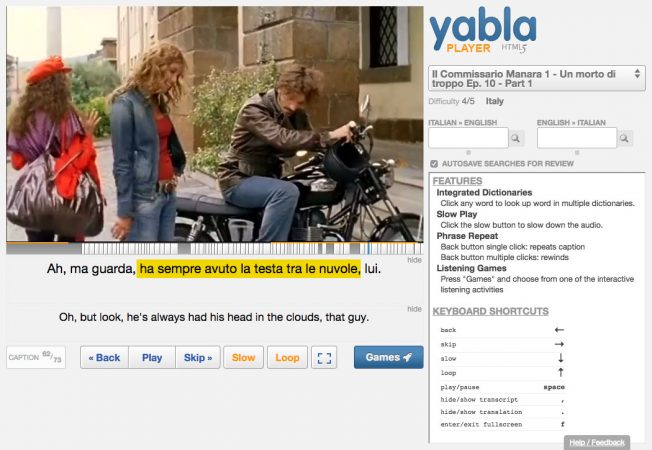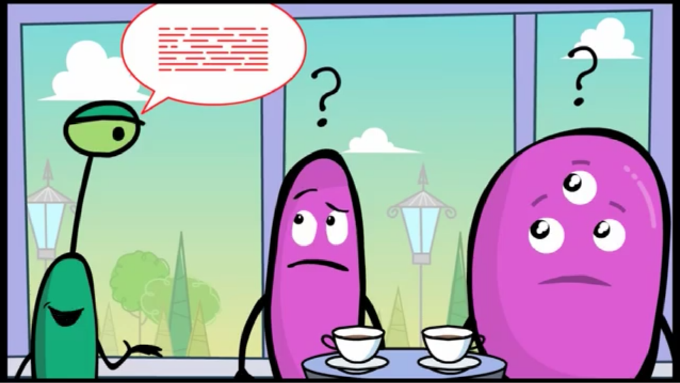Do you know someone who always has his head in the clouds? Then you will love the latest phrase from our study of Il Commissario Manara on Yabla.
Luca and Lara are about to take off on Luca’s motorcycle but Luca has forgotten il pieno, to fill up the tank. But Luca’s sister Teresa knows why and she says:
Ah, ma guarda, ha sempre avuto la testa tra le nuvole, lui.
Ah, but look, he has always had his head in the clouds, that one.
This one is pretty easy, right? It is, in fact, almost exactly as we say it in English. Here’s the exact literal translation:
avere la testa tra/fra le nuvole
to have the head among/between the clouds
Note the meaning of tra/fra, we’ll come back to that in a bit.
Here are some more examples from Reverso:
Maggie aveva sempre la testa tra le nuvole.
Maggie always had her head in the clouds.
Sì, scusa, ho la testa tra le nuvole.
Yes, excuse me, I have my head in the clouds.
Artù ha la testa fra le nuvole.
Arthur has his head in the clouds.
Mi dispiace, credo di avere la testa tra le nuvole.
I’m sorry, I believe I have my head in the clouds.
Dovete scusare mio fratello, ha la testa tra le nuvole.
You must excuse my brother, he has his head in the clouds.
Quel ragazzo ha la testa fra le nuvole ultimamente.
That kid has his head in the clouds lately.
Non lo so, mi sembra uno con la testa tra le nuvole.
I don’t know, he seems like someone with his head in the clouds.
Sei sempre con la testa tra le nuvole!
You always have your head in the clouds.
So, as always with the Italian language, there is an interesting question here. Should you use tra or fra? According to Google, they are about evenly used with tra coming out ahead by a small margin. Fra seems to roll off the tongue easier for me in this instance, but the characters in Il Commissario Manara seem to prefer testa tra le nuvole.
But is there actually a difference?
Well, even some native Italians aren’t sure, as this discussion from Word Reference indicates. But, for the most part Italians agree, they are perfectly interchangeable. So why are there two? Mainly for purposes of euphony. Italians don’t like too many repeated sounds in the same sentence. Hence, if you need to use tra twice in the same sentence, it sounds better to the Italian ear to switch the second one to fra (or vice versa).
For example, there are a few very phrases that use fra or tra and could end up back to back. Fra poco, for example, means in a little while, or soon. Detto fra noi means just between us, between you and me and the fence post so to speak.
Detto tra noi, fra poco tornerò.
Just between us, in a little while I’ll be back.
Ce l’avrò tra le mani fra poco
I will have it in my hands soon.
Who will you be describing this week when you use your new Italian phrase? Chi ha la testa tra le nuvole? Tell us on Facebook!
Wait… what language is THAT?
Yabla Italian is an excellent tool to help you develop an ear for spoken Italian. (I use Yabla personally to study three different languages.) With Yabla Italian you will have:
- verbatim subtitles in Italian
- access to English subtitles when you need them
- the ability to turn the subtitles off as you improve
- quizzes to gauge how well you’re doing
And… this is especially useful… you can slow the video down! Yes! We all know how fast the Italians talk. You know a lot of the words. If you just had a little more time to process them…. Well, now you do!
If you feel your Italian is good enough to watch without Italian (or English) subtitles, this episode of Il Commissario Manara is also available for free from RAI. You will need to fast forward to exactly 48 minutes for the start of Un morto di troppo.





0 Comments